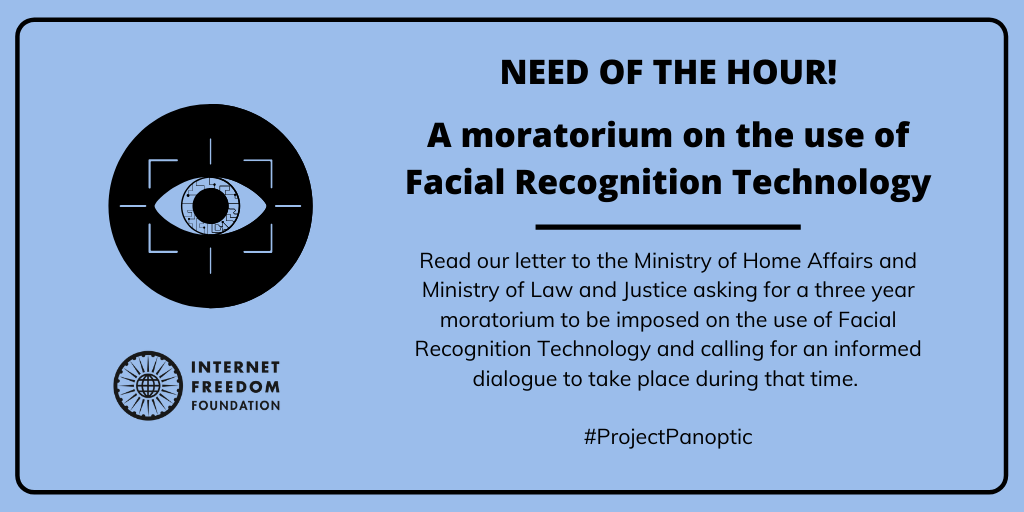
Tl;dr
On 19 March 2020, we shared a letter with the Ministries of Home Affairs and Law and Justice requesting for a halt on ongoing use of facial recognition systems by both the central government and state governments. This is a response to recent statements by the Union Home Minister in the Indian Parliament of the use of such technologies in the investigations on the Delhi riots. IFF’s position on this front is informed by our own institutional work of mapping the deployment of facial recognition systems in India. In the letter, we also propose that the government impose a three year moratorium on this technology. In addition we propose the Government undertake a public consultation with various stakeholders in order to ensure that future uses of such nascent technologies remain fair, transparent and accountable.
The Problem with Facial Recognition Technology
As outlined in our previous posts, use of facial recognition technology in India is on the rise. The Central Government and different State Governments have already started deploying facial recognition technology for two major purposes: Security/Surveillance and Authentication of Identity. At the level of the central government itself, multiple ministries are undertaking projects which rely on facial recognition systems. Moreover, they have allocated large amounts of public funds. These ministries include:
- The Ministry of Railways
- The Ministry of Civil Aviation
- The Ministry of Home Affairs
As we have suggested in our blogpost, use of this technology in a legal vacuum will lead to unprecedented and irreparable harms to the right to privacy. Here, we take the liberty to draw your attention to the Hon’ble Supreme Court's decision in Justice K.S. Puttaswamy vs Union of India which says that certain standards have to be met in order to justify intrusion by the State into the right to privacy. These standards are legality (existence of a law), legitimate goal/state aim, proportionality between the objects and the means adopted to achieve them, and procedural guarantees to check against the abuse of State interference. Laws with regard to FRT and personal data protection which can act as a legal safeguard do not currently exist in India.
The implementation of facial recognition technology would also violate fundamental rights by facilitating mass surveillance. For instance, there will be a chilling effect on the right to freedom of speech and expression because people will be wary of being prosecuted in case they express anti-government sentiments. Further, the right to freedom of movement would be hampered as mass surveillance would allow the government to track the movements of individuals in real time across the country.
Implementation of facial recognition technology in India has the potential of turning the country into a surveillance state. The problems that arise would not only affect the fundamental rights and civil liberties of individuals but also create mistrust towards any positive initiatives that the Government might undertake if no legal safeguards and best practices are put in place.
Recommendations made in our letter
Taking into consideration how other countries have approached this technology and based on India’s experience with Aadhaar, it would be advisable to hit pause and contemplate the serious challenges that come with such an invasive technology. Retrospectively regulating an already introduced measure would be an extremely difficult task and would mean setting ourselves up for failure. Taking the lead in flagging this issue, we propose a moratorium of three years on the ongoing FRT projects in India.
Therefore, we are making the following recommendations:
- Impose a three year moratorium on facial recognition technology for government projects.
- Pass a strong data protection law with adequate checks and balances on state usage of facial recognition systems by both government and non-government actors.
- Commence a public and transparent consultation where government, industry, civil society, human rights groups, academia and similar stakeholders have a proactive dialogue which can articulate a policy-making/legislative pathway on the issue. The conversation must be nuanced enough to differentiate between different uses of the technology which can span governance, monitoring, law enforcement, commercial, R&D, academia, healthcare, and many more unforeseeable domains.
Under Project Panoptic, IFF will continue to keep tabs of these developments and work towards holding the Government accountable when they use such experimental technologies, which are so intrusive.
Important Documents
- IFF’s representation requesting a moratorium on facial recognition technology (link)
- Introduction to Facial Recognition Projects in India (link)
- Problems with Facial Recognition Technology Operating in a Legal Vacuum (link)
- Lessons from the International Debate on Facial Recognition (link)
(This post has been authored by Anushka Jain, a legal fellow at IFF, and reviewed by IFF staffer Sidharth)
Even masks will not save you from facial recognition technology! Help IFF #saveourprivacy by becoming a member today!
Worried about the government’s increasing invasions into your privacy. Kick start the conversation with our community on IFF’s new forum at forum.internetfreedom.in.
#ProjectPanoptic #FacialRecognition
